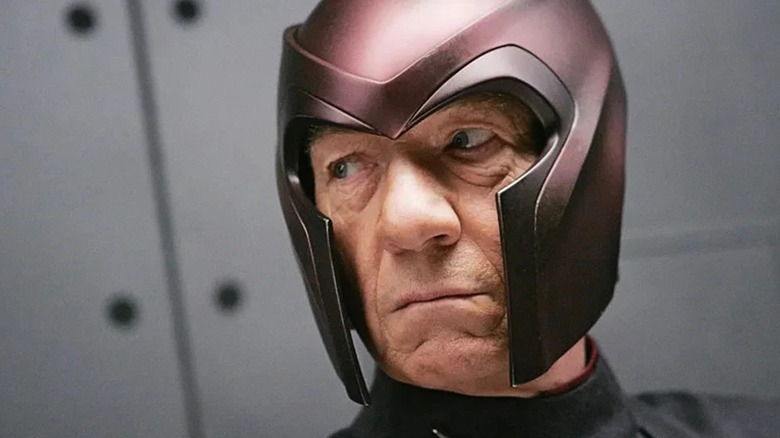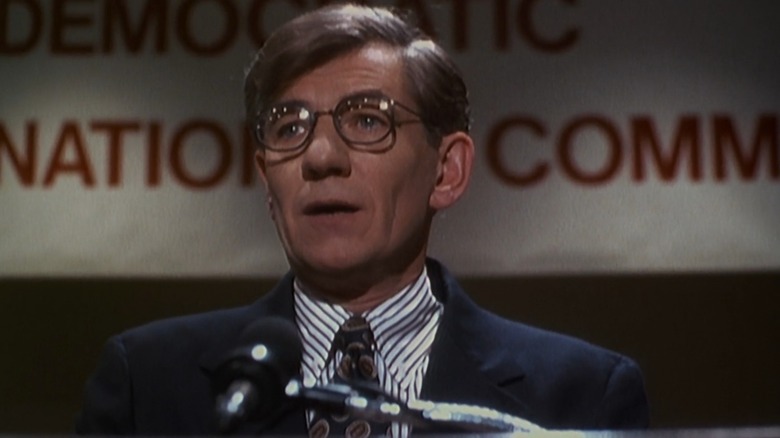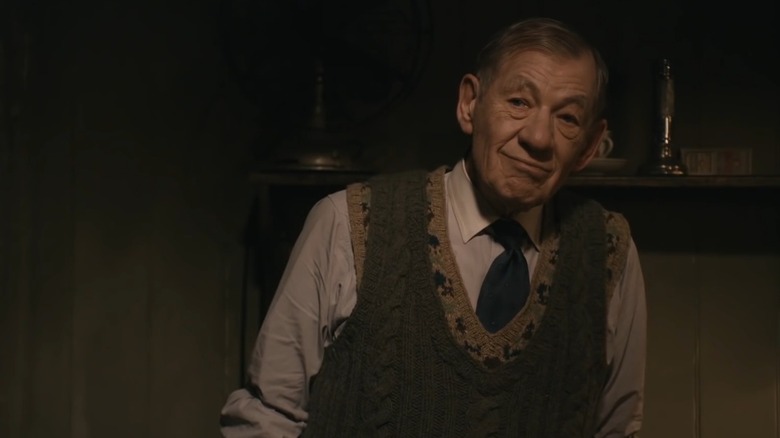The Two Perfect Ian McKellen Movies According To Rotten Tomatoes
What would the moviegoing experience be without Sir Ian McKellen? An actor with a towering, half-century-plus career, theater-trained performer McKellen has become synonymous not just with great plays and serious dramas, but with huge sci-fi and fantasy blockbusters. McKellen headlined two major franchises in the aughts, playing indelible parts in both Peter Jackson' "Lord of the Rings" trilogy (plus the less beloved prequel saga) and pre-MCU superhero standout the "X-Men" trilogy.
McKellen adds his signature gravitas to every role, and he's elevated plenty of so-so films, like "The Da Vinci Code," "The Golden Compass," and — dare I say — "Cats." With a career so sprawling and significant, it's difficult to say just which of McKellen's films is his best, but where human brains fail, the (sometimes super-wonky) metrics of the Rotten Tomatoes algorithm theoretically succeed. We may not be able to pick just one McKellen performance that stands above the rest, but according to the review aggregate site, the actor has appeared in two different movies that have achieved unilateral praise from critics. They aren't the blockbusters mentioned above, nor the films that earned McKellen his two Oscar nominations. Rather, the two best-reviewed films in the actor's career are complex, intense dramas made decades apart.
McKellen earned an Emmy nod for a powerful AIDS drama
The first critically "perfect" McKellen movie is technically a TV film. Released in 1993 on HBO (and later replayed on NBC), "And The Band Played On" was a bold look at the scientific, political, social, and personal realities of the AIDS epidemic in America. The film starred Matthew Modine (most recently of "Stranger Things" fame) and Alan Alda as two researchers with opposing agendas making vital (but at times bureaucratically thwarted) discoveries about the nature of HIV/AIDS as an alarming number of gay men begin dying. McKellen plays gay activist Bill Kraus, a congressional aide who in real life died from the virus in 1986.
All twelve critics RT cites as reviewing the film gave it a positive review. For the LA Times, Howard Rosenberg wrote that "At its best, 'And the Band Played On' taps out the dark, foreboding rhythms of a mystery," while at its worst, the movie "appears to congeal disparate elements into a single gelatin." Like other critics, though, Rosenberg commends the film for attempting to translate its source material — a layered, detailed nonfiction tome by Randy Shilts — for a moviegoing audience. "There is a lot of material to draw together, and the complexities of Shilts' book would challenge almost any scenarist," he writes.
"And The Band Played On" won acclaim, earning an Emmy nomination for McKellen as well as five other actors involved (its cast was sprawling, and also included Richard Gere, BD Wong, Lily Tomlin, and even Steve Martin). The movie won the Emmy trophy for Outstanding Made For Television Movie, and also took home the Humanitas Award and a GLAAD honor. Despite its impressive reputation, there are some ways in which the film reflects the still-flawed attitudes surrounding queer people and HIV/AIDS. As Rosenberg writes, it has a tendency to turn its straight doctor hero into a white knight of unbelievable proportions, while its LGBTQ+ characters never really touch kiss on screen, "as if TV's sanitizers had stepped in and quarantined gay characters from the reality of their sexual orientation."
His actorly showdown with Anthony Hopkins earned rave reviews
McKellen's second perfect-score film would come over two decades later, when he headlined an a 2015 adaptation of Ronald Harwood's 1980 play "The Dresser" opposite Sir Anthony Hopkins. Though not nearly as explicit a queer text as "And The Band Plays On," "The Dresser" nonetheless deals with a thorny, extremely complicated yet intimate relationship between two men. One is a domineering Shakespearean actor known only as Sir to the audience (Hopkins), while the other is his "dresser," Norman (McKellen), who has devoted his life to helping the actor prepare to go on stage despite never stepping into the spotlight himself. As Sir struggles to cling to his sense of power while aging, Norman faces an uncertain future, and the pair's increasingly dysfunctional relationship plays out against the backdrop of World War II air raids.
Another movie that bypassed theaters entirely, "The Dresser" premiered on BBC 2 in the UK (it later aired on Starz in the U.S.), where it found instant acclaim. An actor's showcase for two of the best performers of their generation, critics found "The Dresser" engaging for its performances and its layered approach to the source material — both Harwood's play and "King Lear," the play Sir performs in the film. "The best part of 'The Dresser' is watching Hopkins and McKellen, two actors at the peak of their considerable powers, playing off each other," Vogue's Julia Felsenthal wrote in one of the 14 positive reviews recorded by Rotten Tomatoes. "Their relationship," she explained, "is an elaborate, codependent dance, worked out over the course of decades."
Rotten Tomatoes' data doesn't always get it right, but "The Dresser" and "And The Band Played On" seem to be great movies by any definition. You shouldn't need an excuse to watch a great Ian McKellen performance; if you want to watch two today, you can find "And The Band Played On" on HBO's streamer Max, while "The Dresser" is still available on Starz.


